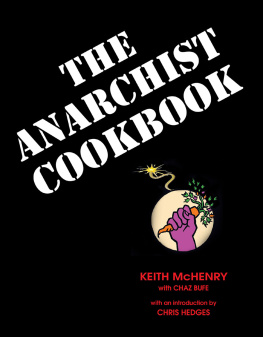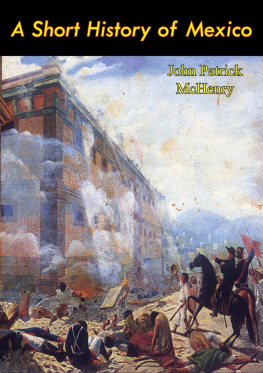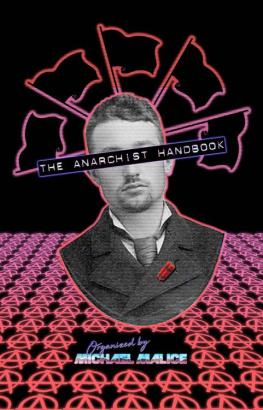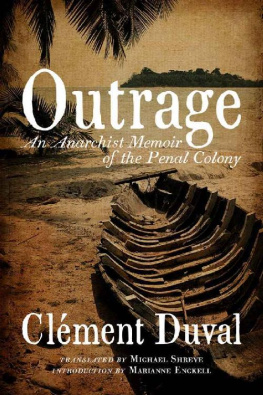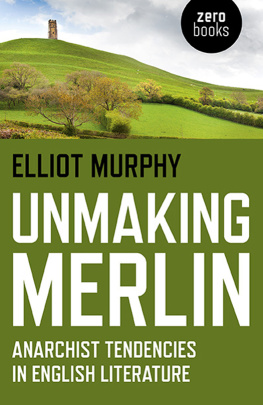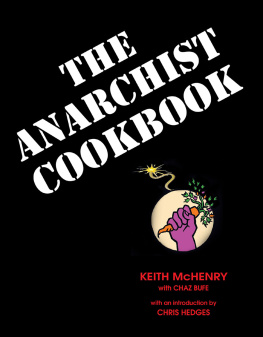McHenry - The Anarchist Cookbook
Here you can read online McHenry - The Anarchist Cookbook full text of the book (entire story) in english for free. Download pdf and epub, get meaning, cover and reviews about this ebook. year: 2015, publisher: See Sharp Press, genre: Politics. Description of the work, (preface) as well as reviews are available. Best literature library LitArk.com created for fans of good reading and offers a wide selection of genres:
Romance novel
Science fiction
Adventure
Detective
Science
History
Home and family
Prose
Art
Politics
Computer
Non-fiction
Religion
Business
Children
Humor
Choose a favorite category and find really read worthwhile books. Enjoy immersion in the world of imagination, feel the emotions of the characters or learn something new for yourself, make an fascinating discovery.
The Anarchist Cookbook: summary, description and annotation
We offer to read an annotation, description, summary or preface (depends on what the author of the book "The Anarchist Cookbook" wrote himself). If you haven't found the necessary information about the book — write in the comments, we will try to find it.
The Anarchist Cookbook — read online for free the complete book (whole text) full work
Below is the text of the book, divided by pages. System saving the place of the last page read, allows you to conveniently read the book "The Anarchist Cookbook" online for free, without having to search again every time where you left off. Put a bookmark, and you can go to the page where you finished reading at any time.
Font size:
Interval:
Bookmark:
Copyright 2015 by Keith McHenry and Chaz Bufe. Introduction copyright 2015 by Chris Hedges. All rights reserved.
For information contact:
See Sharp Press LLC
P.O. Box 1731
Tucson, AZ 85702
www.seesharppress.com
The Anarchist cookbook / by Keith McHenry with Chaz Bufe
Tucson, Ariz.: See Sharp Press, 2015.
154 p. : ill. ; 28 cm.
Includes bibliographical references and index.
ISBN 978-1-937276-76-8
Contents:
1. Anarchism. 2. Cooking, American -- Recipes. 3. United States -- Economic conditions -- 21st century. 4. Food -- Political aspects. 5. Food relief. I. McHenry, Keith. II. Bufe, Charles.
320.57
Portions of this book previously appeared in somewhat different form in Hungry for Peace, by Keith McHenry, Provocations, by Chaz Bufe, The Complete Manual of Pirate Radio, by Zeke Teflon, and You Cant Blow Up a Social Relationship, by our favorite author, Anonymous.
This book is dedicated to

J ulien Benda in his 1927 classic The Treason of IntellectualsLa Trahison des Clercsargued that we are faced with two options in life. We can serve the goals of privilege and power or the virtues of justice and truth. But, Benda warned, the more we make concessions to privilege and power the more we diminish the capacity for justice and truth. This is a truth any anarchist understands.
As long as social injustice lasts we shall remain in a state of permanent revolution, the French anarchist Elise Reclus said in the same vein.
This, to me, is what it means to be an anarchist. Peter Kropotkin made this point when he said that anarchists do not seek power for themselves but understand the close dependency on everyones happiness upon the happiness of all; and of the sense of justice, or equity, which brings the individual to consider the right of every other individual as equal to his [or her] own. Anarchists understand that power is always the problem. It does not matter who wields it. And to remain steadfast to the virtues of justice and truth we must be eternally alienated from and antagonistic to all forms of power.
Kropotkin also grasped that the indiscriminate violence and terrorism practiced by some in the anarchist movement was a grotesque caricature of anarchism. Violence, he warned, demoralized and ultimately corrupted any revolutionary cadre. It justified the harsh counter violence of the state and discredited anarchism in the eyes of the public. Those who employ violence against the enemy, he knew, soon employ violence against internal rivals, as the Bolsheviks amply demonstrated. Revolutions are nonviolent. They succeed by appealing to the consciences of people within the structures of power who will no longer defend a discredited elite. No revolution succeeds until a significant segment of the organs of internal security and the state bureaucracy defect or refuse to use coercion to defend the ancien rgime. This was as true in revolutionary France as it was in revolutionary Russia.
It is only, Benda wrote, when we are not in pursuit of practical aims or material advantages that we can serve as a conscience and a corrective. All those whose primary allegiance is to the practical aims of power and material advantageeven if they defend this allegiance as one that will lead to justice and truthare corrupted intellectually and morally. Anarchists, like the intellectuals Benda lauds, must be indifferent to popular passions. They must set an example of attachment to the purely disinterested activity of the mind and create a belief in the supreme value of this form of existence. They must look as moralists upon the conflict of human egotisms. They must preach in the name of humanity or justice, the adoption of an abstract principle superior to and directly opposed to these passions. Benda conceded that those who hold fast to these principles are often unable to prevent the powerful from filling all history with the noise of their hatred and their slaughters. But they did, at least, prevent the laymen from setting up their actions as a religion, they did prevent them from thinking themselves great men as they carried out these activities. In short, Benda asserted, humanity did evil for two thousand years, but honored good. This contradiction was an honor to the human species, and formed the rift whereby civilization slipped into the world. But once the intellectuals began to play the game of political passions, those who had acted as a check on the realism of the people began to act as its stimulators.
All forms of centralized power, from Vladimir Lenin and the Bolsheviks to the corporate state, seek to crush this spirit, which is the spirit of anarchism. The Russian revolutionary Victor Serge understood this when he wrote every revolutionary government is by its very nature conservative and therefore retrograde. Power exercises upon those who hold it a baleful influence which is often expressed in deplorable occupational perversions. Power seeks, even when in the opposition, to make cadre loyal to its doctrine and its hierarchy. It seeks, in short, to capture the individual conscience and make it serve the ends of power. This is done through the promise of lofty ideals and goals. But all who surrender to the dictates of any power structure became captives to the basest instincts of human existence.
Mikhail Bakunin, who foresaw the counterrevolution that would be imposed by the Bolsheviks, also made this point. A genuine revolution he said does not foist upon the people any new regulations, orders, styles of life, but merely unleashes their will and gives wide scope to their self-determination and their economic and social organization, which must be created by themselves from below and not from above. It must make impossible after the popular victory the establishment of any state power over the peopleeven the most revolutionary, even your powerbecause any power, whatever it calls itself, would inevitably subject the people to old slavery in new form.
Anarchists are the guardians of liberty. Their role, holding fast to justice and truth, is to thwart the lust by centralized power for absolute control. This means, unlike the protestations of black bloc self-styled anarchists, engaging in strategies and tactics that keep the powerful fearful of a public that refuses to be chained and that will revolt if they are manacled. And this makes anarchism the most important creed of our era, for it places its faith in perpetual resistance rather than the accumulation of power. The most successful examples of anarchist power took place in Russia after the 1917 revolution with the rise of the Soviets and during the civil war in Spain. These anarchist achievements, before being crushed by force, made visible the egalitarian and decentralized structures that are led by the people as opposed to a new class of bureaucratic mandarins. These structures must be our model as we enter an age of diminishing resources and corporate totalitarianism.
We have undergone a corporate coup dtat. It is over. They have won. A handful of corporate global oligarchs have seized everythingwealth, power and privilegeand the rest of us struggle as part of a vast underclass, increasingly impoverished and ruthlessly repressed. These oligarchs have cemented into place the most sophisticated and terrifying security and surveillance apparatus in human history. They have militarized police and given them license to kill with impunity. They have stripped us of our most basic civil liberties, including the right to privacy, can hold us in indefinite detention without access to the courts or due process, and have authorized the government to order the assassination of fellow citizens. At the same time, the corporate state through its corrupted elected officials and courts have established another set of laws and regulations for the power elite, ones that legalize criminality and perpetuate what is little more than a global mafia. Electoral politics is a charade. Money has replaced the vote. The consent of the governed is a cruel joke. And, handing us our death sentence, corporations have unleashed fossil fuel industries to ravage the planet, threatening the viability of the human species, along with all other species.
Next pageFont size:
Interval:
Bookmark:
Similar books «The Anarchist Cookbook»
Look at similar books to The Anarchist Cookbook. We have selected literature similar in name and meaning in the hope of providing readers with more options to find new, interesting, not yet read works.
Discussion, reviews of the book The Anarchist Cookbook and just readers' own opinions. Leave your comments, write what you think about the work, its meaning or the main characters. Specify what exactly you liked and what you didn't like, and why you think so.

